Deck 11: Exchange Rates I: the Monetary Approach in the Long Run
Question
Question
Question
Question
Question
Question
Question
Question
Question
Question
Question
Question
Question
Question
Question
Question
Question
Question
Question
Question
Question
Question
Question
Question
Question
Question
Question
Question
Question
Question
Question
Question
Question
Question
Question
Question
Question
Question
Question
Question
Question
Question
Question
Question
Question
Question
Question
Question
Question
Question
Question
Question
Question
Question
Question
Question
Question
Question
Question
Question
Question
Question
Question
Question
Question
Question
Question
Question
Question
Question
Question
Question
Question
Question
Question
Question
Question
Question
Question
Question

Unlock Deck
Sign up to unlock the cards in this deck!
Unlock Deck
Unlock Deck
1/152
Play
Full screen (f)
Deck 11: Exchange Rates I: the Monetary Approach in the Long Run
1
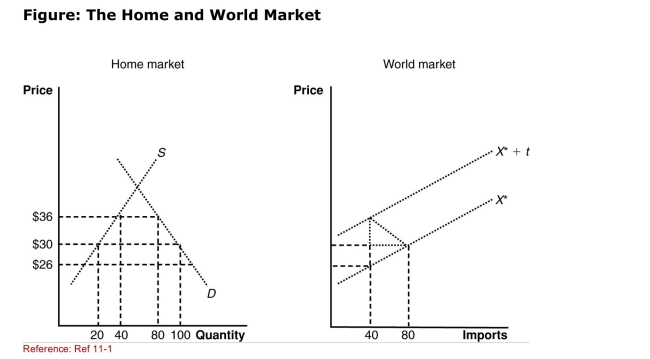 (Figure: The Home and World Markets) Using the graphs, the
(Figure: The Home and World Markets) Using the graphs, theAmount imported by the home market under free trade is:
A)20.
B)40.
C)60.
D)80.
D
2
Which of the following features is included in the NAFTA
Agreement?
I)a common tariff structure adopted by Canada, Mexico, and the
United States
II)elimination of tariffs on trade among Canada, Mexico, and the
United States
III)free mobility of labor and capital among Canada, Mexico, and
The United States
A)I
B)II
C)III
D)I, II, and III
Agreement?
I)a common tariff structure adopted by Canada, Mexico, and the
United States
II)elimination of tariffs on trade among Canada, Mexico, and the
United States
III)free mobility of labor and capital among Canada, Mexico, and
The United States
A)I
B)II
C)III
D)I, II, and III
B
3
When a large nation imposes a tariff, which of the following is
NOT a cost incurred?
A)deadweight efficiency loss
B)reduced consumer surplus
C)deterioration of terms of trade for the trading partners
D)falling government revenues for the nation imposing the tariff
NOT a cost incurred?
A)deadweight efficiency loss
B)reduced consumer surplus
C)deterioration of terms of trade for the trading partners
D)falling government revenues for the nation imposing the tariff
D
4
Which of the following is NOT a regional trade agreement
Currently (2014) being considered?
A)the TransPacific Partnership
B)the TransAtlantic Trade and Investment Partnership
C)the North American Free Trade Area
D)the EuropeJapan Free Trade Area
Currently (2014) being considered?
A)the TransPacific Partnership
B)the TransAtlantic Trade and Investment Partnership
C)the North American Free Trade Area
D)the EuropeJapan Free Trade Area

Unlock Deck
Unlock for access to all 152 flashcards in this deck.
Unlock Deck
k this deck
5
Many regional trade agreements include other provisions that are
Not part of the treaty, but they are addons that might be
Important to trade issues.These are called:
A)addenda.
B)side agreements.
C)environmental pacts.
D)worker rights documents.
Not part of the treaty, but they are addons that might be
Important to trade issues.These are called:
A)addenda.
B)side agreements.
C)environmental pacts.
D)worker rights documents.

Unlock Deck
Unlock for access to all 152 flashcards in this deck.
Unlock Deck
k this deck
6
What was the result of the Climate Summit held in December
2009?
A)All countries signed binding agreements to reduce their greenhouse gases by 20% during the next 10 years.
B)No country signed binding agreements to reduce their greenhouse gases.
C)Only developed industrialized countries agreed to reduce their greenhouse gases by 20% during the next 10 years.
D)Only China and India agreed to reduce their greenhouse gases by 20% during the next 10 years.
2009?
A)All countries signed binding agreements to reduce their greenhouse gases by 20% during the next 10 years.
B)No country signed binding agreements to reduce their greenhouse gases.
C)Only developed industrialized countries agreed to reduce their greenhouse gases by 20% during the next 10 years.
D)Only China and India agreed to reduce their greenhouse gases by 20% during the next 10 years.

Unlock Deck
Unlock for access to all 152 flashcards in this deck.
Unlock Deck
k this deck
7
The "most favored nation principle" means:
A)that member countries can enter into exclusive favorable agreements with some countries.
B)that member countries are barred from forming agreements outside their geographic vicinity.
C)that member countries must apply the same low tariffs to all WTO member countries.
D)that member countries must apply differential tariffs on imports from nonWTO countries.
A)that member countries can enter into exclusive favorable agreements with some countries.
B)that member countries are barred from forming agreements outside their geographic vicinity.
C)that member countries must apply the same low tariffs to all WTO member countries.
D)that member countries must apply differential tariffs on imports from nonWTO countries.

Unlock Deck
Unlock for access to all 152 flashcards in this deck.
Unlock Deck
k this deck
8
Which of the following is NOT part of the NAFTA?
A)tariff elimination on trade between member nations
B)an agreement on worker rights in each country
C)an agreement on environmental conditions in each country
D)elimination of restrictions on movement of labor between member countries
A)tariff elimination on trade between member nations
B)an agreement on worker rights in each country
C)an agreement on environmental conditions in each country
D)elimination of restrictions on movement of labor between member countries

Unlock Deck
Unlock for access to all 152 flashcards in this deck.
Unlock Deck
k this deck
9
Figure: The Home and World Market 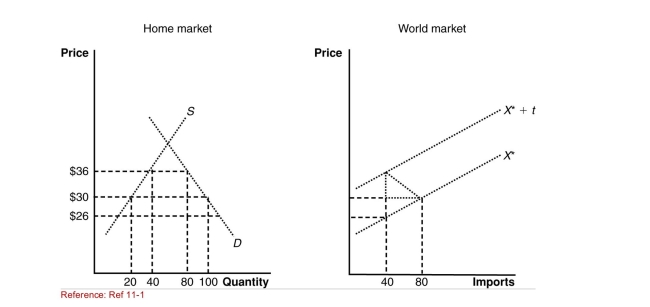 (Figure: The Home and World Markets) The graphs show the case
(Figure: The Home and World Markets) The graphs show the case
For a tariff imposed by a large country.According to these graphs, if
The world price of the product is given as $30, then home market
Firms will produce _______ and the total demand for the good will
Be _______.
A)40; 100
B)20; 80
C)20; 100
D)40; 80
 (Figure: The Home and World Markets) The graphs show the case
(Figure: The Home and World Markets) The graphs show the caseFor a tariff imposed by a large country.According to these graphs, if
The world price of the product is given as $30, then home market
Firms will produce _______ and the total demand for the good will
Be _______.
A)40; 100
B)20; 80
C)20; 100
D)40; 80

Unlock Deck
Unlock for access to all 152 flashcards in this deck.
Unlock Deck
k this deck
10
In a largecountry case, an optimal tariff is one for which the
Termsoftrade gain exceeds the:
A)producer surplus.
B)increased price of the product imported.
C)deadweight loss.
D)consumer surplus.
Termsoftrade gain exceeds the:
A)producer surplus.
B)increased price of the product imported.
C)deadweight loss.
D)consumer surplus.

Unlock Deck
Unlock for access to all 152 flashcards in this deck.
Unlock Deck
k this deck
11
Of the following, which is NOT a regional trade agreement?
A)the World Trade Organization
B)the European Union
C)the North American Free Trade Agreement
D)the Central American Free Trade Agreement
A)the World Trade Organization
B)the European Union
C)the North American Free Trade Agreement
D)the Central American Free Trade Agreement

Unlock Deck
Unlock for access to all 152 flashcards in this deck.
Unlock Deck
k this deck
12
In the largecountry case, when a tariff is imposed, the country:
A)sees a termsoftrade gain.
B)is able to reduce world price of the imported good.
C)is going to experience an increase in consumer surplus.
D)sees a termsoftrade gain and is able to reduce world price of the imported good.
A)sees a termsoftrade gain.
B)is able to reduce world price of the imported good.
C)is going to experience an increase in consumer surplus.
D)sees a termsoftrade gain and is able to reduce world price of the imported good.

Unlock Deck
Unlock for access to all 152 flashcards in this deck.
Unlock Deck
k this deck
13
A regional trade agreement involves:
A)Most, if not all, the nations in the world.
B)several nations, usually trading partners, with a common agenda or geographically linked.
C)nations that agree to trade only with nations in their region.
D)a region of the world with not only trade issues but also political cohesiveness.
A)Most, if not all, the nations in the world.
B)several nations, usually trading partners, with a common agenda or geographically linked.
C)nations that agree to trade only with nations in their region.
D)a region of the world with not only trade issues but also political cohesiveness.

Unlock Deck
Unlock for access to all 152 flashcards in this deck.
Unlock Deck
k this deck
14
The WTO is considered _________, whereas NAFTA and the
European Union are __________.
A)a freetrade area; cartels
B)a cartel; multilateral agreements
C)a freetrade area; multilateral agreements
D)a multilateral agreement; regional trade agreements
European Union are __________.
A)a freetrade area; cartels
B)a cartel; multilateral agreements
C)a freetrade area; multilateral agreements
D)a multilateral agreement; regional trade agreements

Unlock Deck
Unlock for access to all 152 flashcards in this deck.
Unlock Deck
k this deck
15
In a largecountry case, an optimal tariff would be:
A)one that increases the producer surplus.
B)one that raises the price of the product imported.
C)one in which the termsoftrade gain exceeds the deadweight loss.
D)one that easily passes the legislative process.
A)one that increases the producer surplus.
B)one that raises the price of the product imported.
C)one in which the termsoftrade gain exceeds the deadweight loss.
D)one that easily passes the legislative process.

Unlock Deck
Unlock for access to all 152 flashcards in this deck.
Unlock Deck
k this deck
16
Where was the Climate Summit held in December 2009?
A)Brussels
B)New York
C)Seattle
D)Copenhagen
A)Brussels
B)New York
C)Seattle
D)Copenhagen

Unlock Deck
Unlock for access to all 152 flashcards in this deck.
Unlock Deck
k this deck
17
During which round of negotiations did the WTO toughen its
Stance against domestic policies that limit trade?
A)Bretton Woods
B)Uruguay
C)Doha
D)The WTO never toughened its stance against domestic policies.
Stance against domestic policies that limit trade?
A)Bretton Woods
B)Uruguay
C)Doha
D)The WTO never toughened its stance against domestic policies.

Unlock Deck
Unlock for access to all 152 flashcards in this deck.
Unlock Deck
k this deck
18
What is the "most favored nation" principle of the WTO?
A)Trading partners may choose a favorite nation to trade with.
B)Any nation can refuse to trade with another that is not its most favored nation.
C)The WTO has the right to choose the nation that has performed best within the WTO guidelines as its most favored
Nation.
D)Every nation must grant the same rights and treatment to other nations in the WTO as its "most favored nation."
A)Trading partners may choose a favorite nation to trade with.
B)Any nation can refuse to trade with another that is not its most favored nation.
C)The WTO has the right to choose the nation that has performed best within the WTO guidelines as its most favored
Nation.
D)Every nation must grant the same rights and treatment to other nations in the WTO as its "most favored nation."

Unlock Deck
Unlock for access to all 152 flashcards in this deck.
Unlock Deck
k this deck
19
The World Trade Organization is called _______________
Because it involves many, if not most, of the nations in the world.
A)a bilateral trade organization
B)a trilateral trade organization
C)a multilateral trade agreement
D)a quasipolitical trade organization
Because it involves many, if not most, of the nations in the world.
A)a bilateral trade organization
B)a trilateral trade organization
C)a multilateral trade agreement
D)a quasipolitical trade organization

Unlock Deck
Unlock for access to all 152 flashcards in this deck.
Unlock Deck
k this deck
20
In which type of trade agreement does the WTO allow exclusions
To the most favored nation principle?
A)multilateral trade agreements
B)freetrade areas
C)customs unions
D)freetrade areas and customs unions
To the most favored nation principle?
A)multilateral trade agreements
B)freetrade areas
C)customs unions
D)freetrade areas and customs unions

Unlock Deck
Unlock for access to all 152 flashcards in this deck.
Unlock Deck
k this deck
21
Which of the following is(are) the effect(s) of an international
Trade agreement that provides an incentive and reward for
Nations NOT to impose tariffs?
I)an increase in world welfare and standard of living
II)an opportunity for lowincome nations to exploit the gains
From trade.
III)an opportunity for large countries to improve their terms of
Trade
A)I
B)I and II
C)I and III
D)I, II, and III
Trade agreement that provides an incentive and reward for
Nations NOT to impose tariffs?
I)an increase in world welfare and standard of living
II)an opportunity for lowincome nations to exploit the gains
From trade.
III)an opportunity for large countries to improve their terms of
Trade
A)I
B)I and II
C)I and III
D)I, II, and III

Unlock Deck
Unlock for access to all 152 flashcards in this deck.
Unlock Deck
k this deck
22
A "prisoner's dilemma" can arise when:
A)two large countries simultaneously and independently apply tariffs on imports from each other.
B)two large countries simultaneously and independently eliminate tariffs on imports from each other.
C)one large country eliminates tariffs on imports from another large country.
D)one small country eliminates tariffs on imports from a large country.
A)two large countries simultaneously and independently apply tariffs on imports from each other.
B)two large countries simultaneously and independently eliminate tariffs on imports from each other.
C)one large country eliminates tariffs on imports from another large country.
D)one small country eliminates tariffs on imports from a large country.

Unlock Deck
Unlock for access to all 152 flashcards in this deck.
Unlock Deck
k this deck
23
It can be shown that the Nash equilibrium would indicate that
Without any agreements, the best outcome for each large nation
Would be to:
A)not impose a tariff.
B)impose a tariff.
C)find other ways to reward their domestic firms.
D)impose a consumption tax.
Without any agreements, the best outcome for each large nation
Would be to:
A)not impose a tariff.
B)impose a tariff.
C)find other ways to reward their domestic firms.
D)impose a consumption tax.

Unlock Deck
Unlock for access to all 152 flashcards in this deck.
Unlock Deck
k this deck
24
Which of the following agreements signed in 1989 is the
Precursor to NAFTA?
A)the U.S.Mexico Free Trade Agreement
B)the CanadaMexico Free Trade Agreement
C)the CanadaU.S.Free Trade Agreement
D)the CanadaMexicoU.S.Free Trade Agreement
Precursor to NAFTA?
A)the U.S.Mexico Free Trade Agreement
B)the CanadaMexico Free Trade Agreement
C)the CanadaU.S.Free Trade Agreement
D)the CanadaMexicoU.S.Free Trade Agreement

Unlock Deck
Unlock for access to all 152 flashcards in this deck.
Unlock Deck
k this deck
25
A customs union is a trade agreement:
A)in which member countries are free to set their separate tariffs on other countries.
B)in which members agree to set similar tariffs on nonmembers.
C)in which resources are free to move between member countries.
D)in which member countries have common currency.
A)in which member countries are free to set their separate tariffs on other countries.
B)in which members agree to set similar tariffs on nonmembers.
C)in which resources are free to move between member countries.
D)in which member countries have common currency.

Unlock Deck
Unlock for access to all 152 flashcards in this deck.
Unlock Deck
k this deck
26
Which of the following regional trade agreements is a freetrade
Area?
A)NAFTA
B)the European Union
C)Mercosur
D)NATO
Area?
A)NAFTA
B)the European Union
C)Mercosur
D)NATO

Unlock Deck
Unlock for access to all 152 flashcards in this deck.
Unlock Deck
k this deck
27
A freetrade area is:
A)a group of countries that agrees there will be "no rules" about trade-anything goes.
B)a group of countries that agrees to eliminate customs fees and containerized shipping charges on goods traded among
Them.
C)a group of countries that agrees to eliminate barriers to trade between themselves while keeping tariffs in place against the rest
Of the world.
D)a group of countries that eliminates trade barriers among themselves and erects a common tariff against all other nations.
A)a group of countries that agrees there will be "no rules" about trade-anything goes.
B)a group of countries that agrees to eliminate customs fees and containerized shipping charges on goods traded among
Them.
C)a group of countries that agrees to eliminate barriers to trade between themselves while keeping tariffs in place against the rest
Of the world.
D)a group of countries that eliminates trade barriers among themselves and erects a common tariff against all other nations.

Unlock Deck
Unlock for access to all 152 flashcards in this deck.
Unlock Deck
k this deck
28
Which is a better outcome for income and standard of living
Levels for large nations?
A)no tariffs
B)low tariffs
C)high tariffs
D)equal tariffs for all nations
Levels for large nations?
A)no tariffs
B)low tariffs
C)high tariffs
D)equal tariffs for all nations

Unlock Deck
Unlock for access to all 152 flashcards in this deck.
Unlock Deck
k this deck
29
A customs union is:
A)a group of countries that agrees there will be "no rules" about trade-anything goes.
B)a group of countries that agrees to eliminate customs fees and containerized shipping charges on goods traded among
Them.
C)a group of countries agreeing to eliminate barriers to trade between themselves but keeping tariffs in place against the rest
Of the world.
D)a group of countries that eliminates trade barriers among themselves and erects a common tariff against all other nations.
A)a group of countries that agrees there will be "no rules" about trade-anything goes.
B)a group of countries that agrees to eliminate customs fees and containerized shipping charges on goods traded among
Them.
C)a group of countries agreeing to eliminate barriers to trade between themselves but keeping tariffs in place against the rest
Of the world.
D)a group of countries that eliminates trade barriers among themselves and erects a common tariff against all other nations.

Unlock Deck
Unlock for access to all 152 flashcards in this deck.
Unlock Deck
k this deck
30
What happens when two countries apply tariffs against each
Other in an attempt to capture their termsoftrade gain?
A)Both countries lose because the termsoftrade gain for one country is canceled by the tariff in the other country.
B)Both countries gain because the termsoftrade gain for one country is canceled by the tariff in the other country.
C)Neither country gains nor loses because the termsoftrade gain for one country is canceled by the tariff in the other country.
D)The country initially applying the tariff gains because it captures the termsoftrade gain; the other country neither gains
Nor loses.
Other in an attempt to capture their termsoftrade gain?
A)Both countries lose because the termsoftrade gain for one country is canceled by the tariff in the other country.
B)Both countries gain because the termsoftrade gain for one country is canceled by the tariff in the other country.
C)Neither country gains nor loses because the termsoftrade gain for one country is canceled by the tariff in the other country.
D)The country initially applying the tariff gains because it captures the termsoftrade gain; the other country neither gains
Nor loses.

Unlock Deck
Unlock for access to all 152 flashcards in this deck.
Unlock Deck
k this deck
31
In a prisoner's dilemma:
A)all competing parties gain.
B)one competitor gains at the expense of another.
C)all competing parties lose.
D)one competitor loses.
A)all competing parties gain.
B)one competitor gains at the expense of another.
C)all competing parties lose.
D)one competitor loses.

Unlock Deck
Unlock for access to all 152 flashcards in this deck.
Unlock Deck
k this deck
32
Suppose that a large country imposes optimal tariffs on imports
From another large country.The second country then responds
With optimal tariffs on imports from the first country.For these
Two countries, the Nash equilibrium results in ___________ for
The first country and __________ for the second country.
A)losses; losses
B)gains; gains
C)losses; gains
D)gains; losses
From another large country.The second country then responds
With optimal tariffs on imports from the first country.For these
Two countries, the Nash equilibrium results in ___________ for
The first country and __________ for the second country.
A)losses; losses
B)gains; gains
C)losses; gains
D)gains; losses

Unlock Deck
Unlock for access to all 152 flashcards in this deck.
Unlock Deck
k this deck
33
Which of the following is often used to describe regional trade
Agreements that discriminate, giving better tariff treatment to
Other nations in the agreement over outside nation?
A)superregionals
B)preferential trade agreements
C)exclusive trade arrangements
D)equity trade agreements
Agreements that discriminate, giving better tariff treatment to
Other nations in the agreement over outside nation?
A)superregionals
B)preferential trade agreements
C)exclusive trade arrangements
D)equity trade agreements

Unlock Deck
Unlock for access to all 152 flashcards in this deck.
Unlock Deck
k this deck
34
Which of the following statements characterizes NAFTA's
Economic arrangements among its member countries (Canada,
Mexico, and the United States)?
A)There are no restrictions on the movement of labor from one country to another.
B)There are no restrictions on the movement of capital from one country to another.
C)All three countries have adopted the same identical tariff system.
D)There is free trade among the three member countries.
Economic arrangements among its member countries (Canada,
Mexico, and the United States)?
A)There are no restrictions on the movement of labor from one country to another.
B)There are no restrictions on the movement of capital from one country to another.
C)All three countries have adopted the same identical tariff system.
D)There is free trade among the three member countries.

Unlock Deck
Unlock for access to all 152 flashcards in this deck.
Unlock Deck
k this deck
35
Figure: The Home and World Market 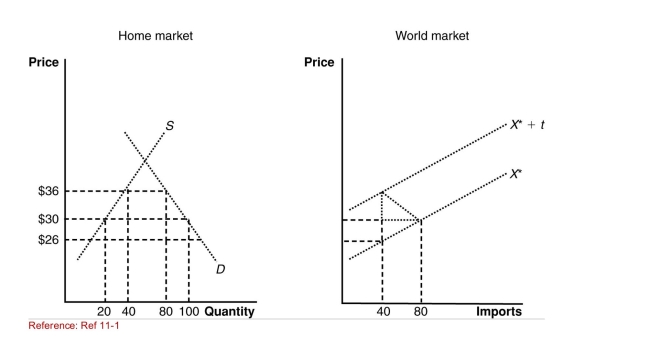 (Figure: The Home and World Markets) The loss of consumer
(Figure: The Home and World Markets) The loss of consumer
Surplus in the home country is:
A)$480.
B)$540.
C)$160.
D)$600.
 (Figure: The Home and World Markets) The loss of consumer
(Figure: The Home and World Markets) The loss of consumerSurplus in the home country is:
A)$480.
B)$540.
C)$160.
D)$600.

Unlock Deck
Unlock for access to all 152 flashcards in this deck.
Unlock Deck
k this deck
36
Which of the following statements about the European Union (EU)
Is CORRECT?
A)EU member countries maintain separate tariff schedules.
B)There is free trade among EU member countries.
C)All EU member countries use a common currency (the euro).
D)All EU member countries have eliminated tariffs on imports from nonEU member countries.
Is CORRECT?
A)EU member countries maintain separate tariff schedules.
B)There is free trade among EU member countries.
C)All EU member countries use a common currency (the euro).
D)All EU member countries have eliminated tariffs on imports from nonEU member countries.

Unlock Deck
Unlock for access to all 152 flashcards in this deck.
Unlock Deck
k this deck
37
Figure: The Home and World Market 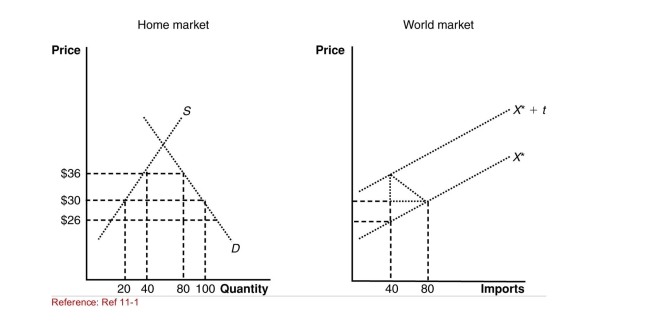 (Figure: The Home and World Markets) The termsoftrade gain is
(Figure: The Home and World Markets) The termsoftrade gain is
_______, and the deadweight loss is _____.
A)$120; $160
B)$160; $160
C)$160; $120
D)$120; $120
 (Figure: The Home and World Markets) The termsoftrade gain is
(Figure: The Home and World Markets) The termsoftrade gain is_______, and the deadweight loss is _____.
A)$120; $160
B)$160; $160
C)$160; $120
D)$120; $120

Unlock Deck
Unlock for access to all 152 flashcards in this deck.
Unlock Deck
k this deck
38
Figure: The Home and World Market 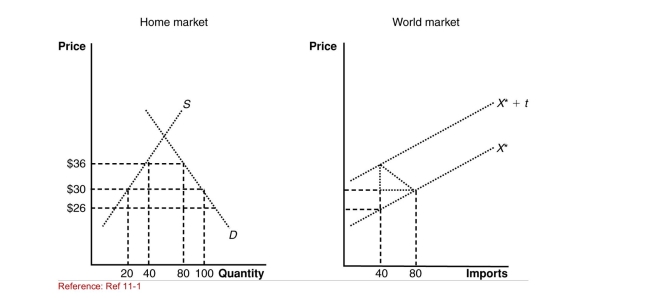 (Figure: The Home and World Markets) If a tariff of $10 is imposed
(Figure: The Home and World Markets) If a tariff of $10 is imposed
By the home country, it causes a loss in the world market of:
A)$240.
B)$160.
C)$200.
D)$80.
 (Figure: The Home and World Markets) If a tariff of $10 is imposed
(Figure: The Home and World Markets) If a tariff of $10 is imposedBy the home country, it causes a loss in the world market of:
A)$240.
B)$160.
C)$200.
D)$80.

Unlock Deck
Unlock for access to all 152 flashcards in this deck.
Unlock Deck
k this deck
39
The WTO (under the GATT agreement) provides that nations may
Enter into regional trade agreements as long as they:
A)limit such agreements to one.
B)extend the provisions to all other nations in the WTO.
C)do not jointly increase tariffs against outside countries.
D)make sure they include smaller nations in their regions.
Enter into regional trade agreements as long as they:
A)limit such agreements to one.
B)extend the provisions to all other nations in the WTO.
C)do not jointly increase tariffs against outside countries.
D)make sure they include smaller nations in their regions.

Unlock Deck
Unlock for access to all 152 flashcards in this deck.
Unlock Deck
k this deck
40
Using game theory as an analytical tool, if one large nation
Imposes tariffs, the total cost is small; however, when several
Trading partners do the same:
A)the costs are even smaller.
B)the costs balance out and there is no harm.
C)the costs are the same but the potential gains are much smaller.
D)then all nations gain.
Imposes tariffs, the total cost is small; however, when several
Trading partners do the same:
A)the costs are even smaller.
B)the costs balance out and there is no harm.
C)the costs are the same but the potential gains are much smaller.
D)then all nations gain.

Unlock Deck
Unlock for access to all 152 flashcards in this deck.
Unlock Deck
k this deck
41
Implementing a regional freetrade agreement may have an
Effect in which, due to reduced tariffs, a nation in the agreement
Begins to import a product it had previously produced itself.This
Effect is called:
A)trade creation.
B)trade diversion.
C)reciprocal trade agreements.
D)the employment effect of FTAs.
Effect in which, due to reduced tariffs, a nation in the agreement
Begins to import a product it had previously produced itself.This
Effect is called:
A)trade creation.
B)trade diversion.
C)reciprocal trade agreements.
D)the employment effect of FTAs.

Unlock Deck
Unlock for access to all 152 flashcards in this deck.
Unlock Deck
k this deck
42
Suppose country X currently produces widgets.Then it
Establishes a preferential trading agreement with country Y.
Following the formation of the PTA, country X no longer produces
Widgets and imports widgets from country Y.What has occurred?
A)There is trade diversion and a welfare gain for both country X and country Y.
B)There is trade diversion, a welfare gain for country Y, and a welfare loss for country X.
C)There is trade creation and a welfare gain for both country X and country Y.
D)There is trade creation, a welfare gain for country Y, and a welfare loss for country X.
Establishes a preferential trading agreement with country Y.
Following the formation of the PTA, country X no longer produces
Widgets and imports widgets from country Y.What has occurred?
A)There is trade diversion and a welfare gain for both country X and country Y.
B)There is trade diversion, a welfare gain for country Y, and a welfare loss for country X.
C)There is trade creation and a welfare gain for both country X and country Y.
D)There is trade creation, a welfare gain for country Y, and a welfare loss for country X.

Unlock Deck
Unlock for access to all 152 flashcards in this deck.
Unlock Deck
k this deck
43
Automobiles imported from Canada or Mexico must have 60%
North American content to be eligible for tariff elimination under
NAFTA rules.This is an example of:
A)a rules of origin requirement.
B)an environmental standard.
C)a health and safety requirement.
D)a preferential trade agreement.
North American content to be eligible for tariff elimination under
NAFTA rules.This is an example of:
A)a rules of origin requirement.
B)an environmental standard.
C)a health and safety requirement.
D)a preferential trade agreement.

Unlock Deck
Unlock for access to all 152 flashcards in this deck.
Unlock Deck
k this deck
44
 (Table: Demand and Supply for Gloves) The United States can also
(Table: Demand and Supply for Gloves) The United States can alsoImport gloves from China at $4 per pair and from Mexico at $5 per
Pair.Currently, the United States imposes a specific tariff of $2 on its
Glove imports.How much trade in gloves is diverted in the U.S.
Mexican freetrade area?
A)zero pairs of gloves
B)6 pairs of gloves
C)2 pairs of gloves
D)4 pairs of gloves

Unlock Deck
Unlock for access to all 152 flashcards in this deck.
Unlock Deck
k this deck
45
SCENARIO: ELECTRIC FAN TRADE
U)S.firms can produce and sell electric fans for $25.The United
States can also import electric fans from China at $40 each and
From Canada at $45 each.Electric fans made in the United
States, China, and Canada are identical.Currently, the United
States imposes a 30% tariff on imported electric fans.
Reference: Ref 112
(Scenario: Electric Fan Trade) For the United States, are there
Trade diversion losses, trade creation gains, or both as a result of
The formation of NAFTA?
A)There are only trade diversions losses
B)There are only trade creation gains.
C)There are neither trade creation gains nor trade diversion losses.
D)There are both trade creation gains and trade diversion losses.
U)S.firms can produce and sell electric fans for $25.The United
States can also import electric fans from China at $40 each and
From Canada at $45 each.Electric fans made in the United
States, China, and Canada are identical.Currently, the United
States imposes a 30% tariff on imported electric fans.
Reference: Ref 112
(Scenario: Electric Fan Trade) For the United States, are there
Trade diversion losses, trade creation gains, or both as a result of
The formation of NAFTA?
A)There are only trade diversions losses
B)There are only trade creation gains.
C)There are neither trade creation gains nor trade diversion losses.
D)There are both trade creation gains and trade diversion losses.

Unlock Deck
Unlock for access to all 152 flashcards in this deck.
Unlock Deck
k this deck
46
 (Table: Demand and Supply for Gloves) The United States can also
(Table: Demand and Supply for Gloves) The United States can alsoImport gloves from China at $4 per pair and from Mexico at $5 per
Pair.Currently, the United States imposes a specific tariff of $2 on its
Glove imports.Suppose that the United States and Mexico form a free
Trade area.How much trade in gloves is created?
A)zero pairs of gloves
B)6 pairs of gloves
C)2 pairs of gloves
D)4 pairs of gloves

Unlock Deck
Unlock for access to all 152 flashcards in this deck.
Unlock Deck
k this deck
47
When products from a highcost country within a customs union
Replace imports from a lowcost country that is not a member of
The union, this is called:
A)trade creation.
B)trade diversion.
C)trade deflection.
D)trade development.
Replace imports from a lowcost country that is not a member of
The union, this is called:
A)trade creation.
B)trade diversion.
C)trade deflection.
D)trade development.

Unlock Deck
Unlock for access to all 152 flashcards in this deck.
Unlock Deck
k this deck
48
In which of the following forms of regional trading agreement are
Rules of origin required?
A)a freetrade area
B)a customs union
C)a common market
D)an economic union
Rules of origin required?
A)a freetrade area
B)a customs union
C)a common market
D)an economic union

Unlock Deck
Unlock for access to all 152 flashcards in this deck.
Unlock Deck
k this deck
49
An example of how trade diversion results in a suboptimal
Situation is auto parts trade between Mexico and the United
States.After NAFTA:
A)Mexico decreased its sales of auto parts to the United States.
B)the United States purchased more auto parts from Mexico due to the elimination of tariffs and reduced purchases from East
Asia, which was the lowestcost producer.
C)the United States brought a complaint against Mexico for low quality auto parts.
D)the United States purchased fewer auto parts from Mexico due to the elimination of tariffs and increased purchases from East
Asia, which was the lowestcost producer.
Situation is auto parts trade between Mexico and the United
States.After NAFTA:
A)Mexico decreased its sales of auto parts to the United States.
B)the United States purchased more auto parts from Mexico due to the elimination of tariffs and reduced purchases from East
Asia, which was the lowestcost producer.
C)the United States brought a complaint against Mexico for low quality auto parts.
D)the United States purchased fewer auto parts from Mexico due to the elimination of tariffs and increased purchases from East
Asia, which was the lowestcost producer.

Unlock Deck
Unlock for access to all 152 flashcards in this deck.
Unlock Deck
k this deck
50
SCENARIO: ELECTRIC FAN TRADE
U)S.firms can produce and sell electric fans for $25.The United
States can also import electric fans from China at $40 each and
From Canada at $45 each.Electric fans made in the United
States, China, and Canada are identical.Currently, the United
States imposes a 30% tariff on imported electric fans.
Reference: Ref 112
(Scenario: Electric Fan Trade) From which of the following
Countries will the United States import fans?
A)China
B)Canada
C)It will import fans from neither China nor Canada.
D)It will import fans from both China and Canada.
U)S.firms can produce and sell electric fans for $25.The United
States can also import electric fans from China at $40 each and
From Canada at $45 each.Electric fans made in the United
States, China, and Canada are identical.Currently, the United
States imposes a 30% tariff on imported electric fans.
Reference: Ref 112
(Scenario: Electric Fan Trade) From which of the following
Countries will the United States import fans?
A)China
B)Canada
C)It will import fans from neither China nor Canada.
D)It will import fans from both China and Canada.

Unlock Deck
Unlock for access to all 152 flashcards in this deck.
Unlock Deck
k this deck
51
What complex set of freetrade area regulations prohibits non
Member country imports to a hightariff member country via a
Lowtariff member country?
A)environmental certification
B)rules of origin
C)health and safety standards
D)a codified trade agreement
Member country imports to a hightariff member country via a
Lowtariff member country?
A)environmental certification
B)rules of origin
C)health and safety standards
D)a codified trade agreement

Unlock Deck
Unlock for access to all 152 flashcards in this deck.
Unlock Deck
k this deck
52
SCENARIO: ELECTRIC FAN TRADE
U)S.firms can produce and sell electric fans for $25.The United
States can also import electric fans from China at $40 each and
From Canada at $45 each.Electric fans made in the United
States, China, and Canada are identical.Currently, the United
States imposes a 30% tariff on imported electric fans.
Reference: Ref 112
(Scenario: Electric Fan Trade) Now suppose that the United
States forms a freetrade area (NAFTA) with Canada and Mexico.
From which country will the United States import fans?
A)China
B)Canada
C)It will import fans from neither China nor Canada.
D)It will import fans from both China and Canada.
U)S.firms can produce and sell electric fans for $25.The United
States can also import electric fans from China at $40 each and
From Canada at $45 each.Electric fans made in the United
States, China, and Canada are identical.Currently, the United
States imposes a 30% tariff on imported electric fans.
Reference: Ref 112
(Scenario: Electric Fan Trade) Now suppose that the United
States forms a freetrade area (NAFTA) with Canada and Mexico.
From which country will the United States import fans?
A)China
B)Canada
C)It will import fans from neither China nor Canada.
D)It will import fans from both China and Canada.

Unlock Deck
Unlock for access to all 152 flashcards in this deck.
Unlock Deck
k this deck
53
Suppose country X currently does not produce widgets.Instead,
It imports widgets from country Z.Then country X establishes a
Preferential trading agreement with country Y.Following the
Formation of the PTA, it imports widgets from country Y.What
Has occurred?
A)There is trade diversion and a welfare loss for country X.
B)There is trade creation and a welfare loss for country Y.
C)There is trade diversion and a welfare gain for country X.
D)There is trade creation and a welfare gain for country Y.
It imports widgets from country Z.Then country X establishes a
Preferential trading agreement with country Y.Following the
Formation of the PTA, it imports widgets from country Y.What
Has occurred?
A)There is trade diversion and a welfare loss for country X.
B)There is trade creation and a welfare loss for country Y.
C)There is trade diversion and a welfare gain for country X.
D)There is trade creation and a welfare gain for country Y.

Unlock Deck
Unlock for access to all 152 flashcards in this deck.
Unlock Deck
k this deck
54
A customs union will increase the welfare of its members and the
Rest of the world if:
A)trade creation is greater than trade diversion.
B)trade creation is less than trade diversion.
C)trade creation is positive.
D)trade diversion is positive.
Rest of the world if:
A)trade creation is greater than trade diversion.
B)trade creation is less than trade diversion.
C)trade creation is positive.
D)trade diversion is positive.

Unlock Deck
Unlock for access to all 152 flashcards in this deck.
Unlock Deck
k this deck
55
To be able to enforce the rules of a freetrade area, goods from
Outside the region imported into the lowesttariff nation cannot
Be shipped ________ into another nation in the area.
A)with no transportation costs
B)without a labor certificate
C)with no customs inspection
D)duty free
Outside the region imported into the lowesttariff nation cannot
Be shipped ________ into another nation in the area.
A)with no transportation costs
B)without a labor certificate
C)with no customs inspection
D)duty free

Unlock Deck
Unlock for access to all 152 flashcards in this deck.
Unlock Deck
k this deck
56
Implementing a regional freetrade agreement may have an
Effect in which, due to reduced tariffs, a nation begins to import a
Product from another member country that it had previously
Imported from outside the new trade region.This effect is called:
A)trade creation.
B)trade diversion.
C)reciprocal trade agreements.
D)the employment effect of FTAs.
Effect in which, due to reduced tariffs, a nation begins to import a
Product from another member country that it had previously
Imported from outside the new trade region.This effect is called:
A)trade creation.
B)trade diversion.
C)reciprocal trade agreements.
D)the employment effect of FTAs.

Unlock Deck
Unlock for access to all 152 flashcards in this deck.
Unlock Deck
k this deck
57
Which of the following represents the stage where economic
Integration is LEAST complete?
A)freetrade area
B)customs union
C)common market
D)economic union
Integration is LEAST complete?
A)freetrade area
B)customs union
C)common market
D)economic union

Unlock Deck
Unlock for access to all 152 flashcards in this deck.
Unlock Deck
k this deck
58
SCENARIO: ELECTRIC FAN TRADE
U)S.firms can produce and sell electric fans for $25.The United
States can also import electric fans from China at $40 each and
From Canada at $45 each.Electric fans made in the United
States, China, and Canada are identical.Currently, the United
States imposes a 30% tariff on imported electric fans.
Reference: Ref 112
(Scenario: Electric Fan Trade) Suppose that the United States
Levied a 10% tariff on imported electric fans (rather than the
30% tariff described in the scenario).For the United States,
Would there be trade diversion losses, trade creation gains, or
Both as a result of the formation of NAFTA?
A)There would be only trade diversions losses.
B)There would be only trade creation gains.
C)There would be neither trade creation gains nor trade diversion losses.
D)There would be both trade creation gains and trade diversion losses.
U)S.firms can produce and sell electric fans for $25.The United
States can also import electric fans from China at $40 each and
From Canada at $45 each.Electric fans made in the United
States, China, and Canada are identical.Currently, the United
States imposes a 30% tariff on imported electric fans.
Reference: Ref 112
(Scenario: Electric Fan Trade) Suppose that the United States
Levied a 10% tariff on imported electric fans (rather than the
30% tariff described in the scenario).For the United States,
Would there be trade diversion losses, trade creation gains, or
Both as a result of the formation of NAFTA?
A)There would be only trade diversions losses.
B)There would be only trade creation gains.
C)There would be neither trade creation gains nor trade diversion losses.
D)There would be both trade creation gains and trade diversion losses.

Unlock Deck
Unlock for access to all 152 flashcards in this deck.
Unlock Deck
k this deck
59
 (Table: Demand and Supply for Gloves) The United States can also
(Table: Demand and Supply for Gloves) The United States can alsoImport gloves from China at $4 per pair and from Mexico at $5 per
Pair.Currently, the United States imposes a specific tariff of $2 on its
Glove imports.Suppose instead that the United States negotiated a
Freetrade agreement with China.Will the United States be better off
Or worse off as a result of its trade in gloves in the freetrade area
With China?
A)It is better off because there are no trade diversion losses.
B)It is worse off because there are no trade creation gains.
C)It is worse off because trade creation gains exceed trade diversion losses.
D)It is better off because trade diversion gains exceed trade creation losses.

Unlock Deck
Unlock for access to all 152 flashcards in this deck.
Unlock Deck
k this deck
60
Why is NAFTA a freetrade area requiring rules of origin rather
Than a customs union?
A)A freetrade agreement allows politically sensitive tariffs of each nation to remain unchanged.
B)A customs union also requires rules of origin.
C)The overall level of U.S.tariffs was much higher than the overall level of tariffs in Mexico and Canada.
D)The overall levels of tariffs in Canada, Mexico, and the United States are similar, making rules of origin irrelevant.
Than a customs union?
A)A freetrade agreement allows politically sensitive tariffs of each nation to remain unchanged.
B)A customs union also requires rules of origin.
C)The overall level of U.S.tariffs was much higher than the overall level of tariffs in Mexico and Canada.
D)The overall levels of tariffs in Canada, Mexico, and the United States are similar, making rules of origin irrelevant.

Unlock Deck
Unlock for access to all 152 flashcards in this deck.
Unlock Deck
k this deck
61
The customs union could lead to losses for the home country if:
A)the other country in the customs union is the most efficient producer.
B)the other country in the customs unions is not the most efficient producer.
C)there are other countries outside the customs union that are inefficient.
D)all countries are efficient producers.
A)the other country in the customs union is the most efficient producer.
B)the other country in the customs unions is not the most efficient producer.
C)there are other countries outside the customs union that are inefficient.
D)all countries are efficient producers.

Unlock Deck
Unlock for access to all 152 flashcards in this deck.
Unlock Deck
k this deck
62
Professor Daniel Trefler at the University of Toronto concluded
That Canada ________ from free trade with the United States
Because _______________.
A)gained; trade creation exceeded trade diversion with the United States
B)lost; trade diversion exceeded trade creation with the United States
C)first gained, then lost; trade diversion exceeded trade creation after NAFTA was fully implemented
D)neither gained nor lost; trade creation equaled its trade diversion with the United States
That Canada ________ from free trade with the United States
Because _______________.
A)gained; trade creation exceeded trade diversion with the United States
B)lost; trade diversion exceeded trade creation with the United States
C)first gained, then lost; trade diversion exceeded trade creation after NAFTA was fully implemented
D)neither gained nor lost; trade creation equaled its trade diversion with the United States

Unlock Deck
Unlock for access to all 152 flashcards in this deck.
Unlock Deck
k this deck
63
If a customs union includes the lowestcost world producer of a
Product, then member countries:
A)will always be better off in trade with that product.
B)will always be worse off in trade with that product.
C)can be better off or worse off depending on the strengths of the trade diversion and trade creation effects for that product.
D)will no longer export or import that product.
Product, then member countries:
A)will always be better off in trade with that product.
B)will always be worse off in trade with that product.
C)can be better off or worse off depending on the strengths of the trade diversion and trade creation effects for that product.
D)will no longer export or import that product.

Unlock Deck
Unlock for access to all 152 flashcards in this deck.
Unlock Deck
k this deck
64
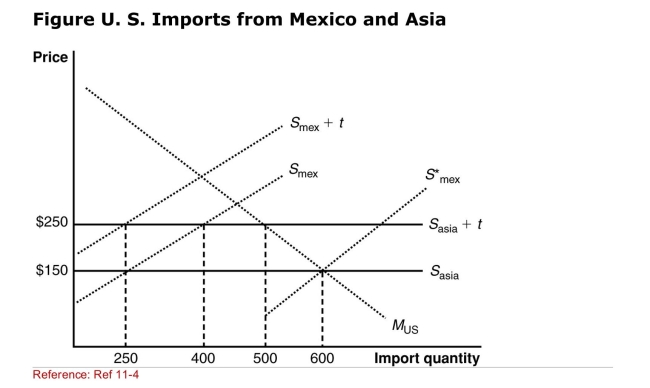 (Figure: U.S.Imports from Mexico and Asia) With the $100 tariff,
(Figure: U.S.Imports from Mexico and Asia) With the $100 tariff,The United States will import ______ from Mexico and _______
From China.
A)400; 100
B)250; 250
C)250; 500
D)400; 200

Unlock Deck
Unlock for access to all 152 flashcards in this deck.
Unlock Deck
k this deck
65
As a result, India fears that some of its:
A)exports to China will be diverted to ASEAN countries.
B)exports to the United States will be diverted to China.
C)exports to China and to ASEAN countries will be diverted to trade among members of the ChinaASEAN freetrade area.
D)imports from ASEAN countries will be diverted to China.
A)exports to China will be diverted to ASEAN countries.
B)exports to the United States will be diverted to China.
C)exports to China and to ASEAN countries will be diverted to trade among members of the ChinaASEAN freetrade area.
D)imports from ASEAN countries will be diverted to China.

Unlock Deck
Unlock for access to all 152 flashcards in this deck.
Unlock Deck
k this deck
66
India is not a member of the ChinaASEAN (Association of South

Unlock Deck
Unlock for access to all 152 flashcards in this deck.
Unlock Deck
k this deck
67
Trade diversion may be such that the combined welfare of two
Nations in the agreement actually ____ because of ____, not
Completely offset by the _____.
A)falls; loss of tariff revenue for the importing nation; gain in the exporting nation's producer surplus
B)rises; gains from trade; loss of jobs in the importing industry
C)rises; gain in tariff revenue; gain in jobs
D)remains the same; loss of tariff revenue; gains from product variety
Nations in the agreement actually ____ because of ____, not
Completely offset by the _____.
A)falls; loss of tariff revenue for the importing nation; gain in the exporting nation's producer surplus
B)rises; gains from trade; loss of jobs in the importing industry
C)rises; gain in tariff revenue; gain in jobs
D)remains the same; loss of tariff revenue; gains from product variety

Unlock Deck
Unlock for access to all 152 flashcards in this deck.
Unlock Deck
k this deck
68
Trade diversion is one reason that some economists:
A)believe we should not even bother to promote free trade.
B)recommend we change our focus from regional trade agreements to the WTO, a multilateral trade agreement.
C)recommend we reinstate some tariffs that were actually beneficial to all nations.
D)think we should exclude lowwage nations from trade agreements.
A)believe we should not even bother to promote free trade.
B)recommend we change our focus from regional trade agreements to the WTO, a multilateral trade agreement.
C)recommend we reinstate some tariffs that were actually beneficial to all nations.
D)think we should exclude lowwage nations from trade agreements.

Unlock Deck
Unlock for access to all 152 flashcards in this deck.
Unlock Deck
k this deck
69
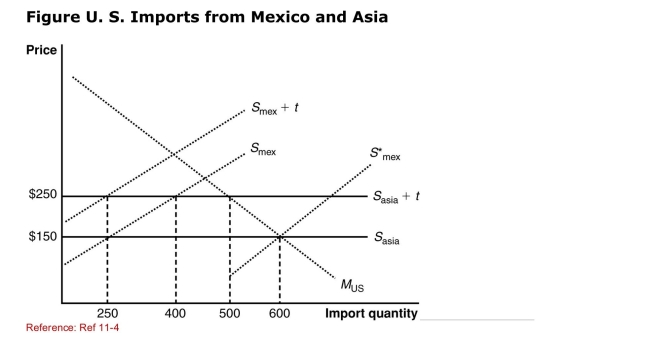 (Figure: U.S.Imports from Mexico and Asia) The graph illustrates
(Figure: U.S.Imports from Mexico and Asia) The graph illustratesA customs union between the United States and Mexico.
According to the graph, under free trade the United States will
Import ________ units of the good from _______ at the price of
_______.
A)600; Mexico; $150
B)600; China; $250
C)350; China; $150
D)500; China; $250

Unlock Deck
Unlock for access to all 152 flashcards in this deck.
Unlock Deck
k this deck
70
Which of the following statements is(are) FALSE?
I)Trade creation is always bad for countries.
II)Trade diversion is always good for countries.
III)Regional trade agreements never cause welfare losses.
A)I
B)II
C)III
D)I, II, and III
I)Trade creation is always bad for countries.
II)Trade diversion is always good for countries.
III)Regional trade agreements never cause welfare losses.
A)I
B)II
C)III
D)I, II, and III

Unlock Deck
Unlock for access to all 152 flashcards in this deck.
Unlock Deck
k this deck
71
A case study of NAFTA, with regard to the benefits for Canada
From U.S.trade, found that:
A)Canada was not able to increase its exports due to barriers still remaining.
B)Canada had modest gains but was harmed by immigration into the United States from Mexico.
C)Canada had more trade diversion than trade creation and so was harmed overall.
D)Canada had more trade creation than trade diversion and so benefited overall.
From U.S.trade, found that:
A)Canada was not able to increase its exports due to barriers still remaining.
B)Canada had modest gains but was harmed by immigration into the United States from Mexico.
C)Canada had more trade diversion than trade creation and so was harmed overall.
D)Canada had more trade creation than trade diversion and so benefited overall.

Unlock Deck
Unlock for access to all 152 flashcards in this deck.
Unlock Deck
k this deck
72
Because it is difficult to negotiate multilateral trade agreements,
Some economists argue that preferential trade agreements are
Always beneficial since they represent a movement toward freer
Trade, which is better than no movement at all.Is this argument
Always correct?
A)Yes; any movement toward freer trade is better than no movement at all.
B)No; some preferential trade agreements may have higher trade diversion costs than trade creation gains.
C)Yes; all preferential trade agreements have higher trade creation gains than trade diversion losses.
D)No; all preferential trade agreements have higher trade diversion losses than trade creation gains.
Some economists argue that preferential trade agreements are
Always beneficial since they represent a movement toward freer
Trade, which is better than no movement at all.Is this argument
Always correct?
A)Yes; any movement toward freer trade is better than no movement at all.
B)No; some preferential trade agreements may have higher trade diversion costs than trade creation gains.
C)Yes; all preferential trade agreements have higher trade creation gains than trade diversion losses.
D)No; all preferential trade agreements have higher trade diversion losses than trade creation gains.

Unlock Deck
Unlock for access to all 152 flashcards in this deck.
Unlock Deck
k this deck
73
Figure U.S.Imports from Mexico and Asia 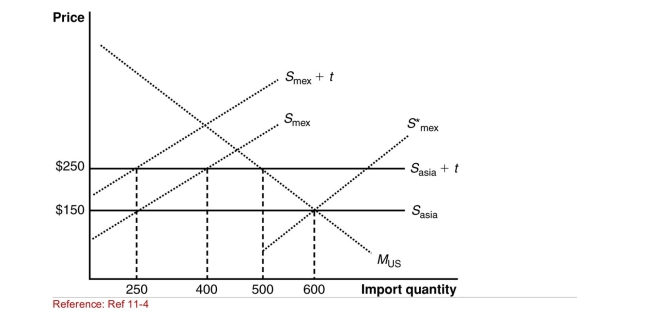 (Figure: U.S.Imports from Mexico and Asia) The $100 tariff by
(Figure: U.S.Imports from Mexico and Asia) The $100 tariff by
The United States results in a tariff revenue of:
A)$25,000.
B)$5,000.
C)$50,000.
D)$2,500.
 (Figure: U.S.Imports from Mexico and Asia) The $100 tariff by
(Figure: U.S.Imports from Mexico and Asia) The $100 tariff byThe United States results in a tariff revenue of:
A)$25,000.
B)$5,000.
C)$50,000.
D)$2,500.

Unlock Deck
Unlock for access to all 152 flashcards in this deck.
Unlock Deck
k this deck
74
If a regional trading agreement causes products from member
Countries to replace imports from nonmember countries, then the
Regional trading agreement will experience:
A)economic gains.
B)trade creation gains.
C)trade diversion losses.
D)trade perversion.
Countries to replace imports from nonmember countries, then the
Regional trading agreement will experience:
A)economic gains.
B)trade creation gains.
C)trade diversion losses.
D)trade perversion.

Unlock Deck
Unlock for access to all 152 flashcards in this deck.
Unlock Deck
k this deck
75
The negative effects of trade diversion are reduced when:
A)trade diversion is more than offset by trade creation.
B)consumers in the importing nation have a change in their buying habits.
C)there is a cost increase in nations outside the region.
D)the freetrade agreement includes more members.
A)trade diversion is more than offset by trade creation.
B)consumers in the importing nation have a change in their buying habits.
C)there is a cost increase in nations outside the region.
D)the freetrade agreement includes more members.

Unlock Deck
Unlock for access to all 152 flashcards in this deck.
Unlock Deck
k this deck
76
Figure U.S.Imports from Mexico and Asia 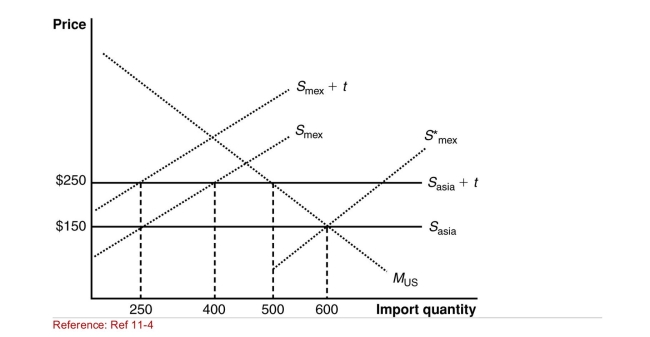 (Figure: U.S.Imports from Mexico and Asia) Suppose the United
(Figure: U.S.Imports from Mexico and Asia) Suppose the United
States imposes a tariff of $100; then the total imports will be:
A)600.
B)250.
C)400.
D)500.
 (Figure: U.S.Imports from Mexico and Asia) Suppose the United
(Figure: U.S.Imports from Mexico and Asia) Suppose the UnitedStates imposes a tariff of $100; then the total imports will be:
A)600.
B)250.
C)400.
D)500.

Unlock Deck
Unlock for access to all 152 flashcards in this deck.
Unlock Deck
k this deck
77
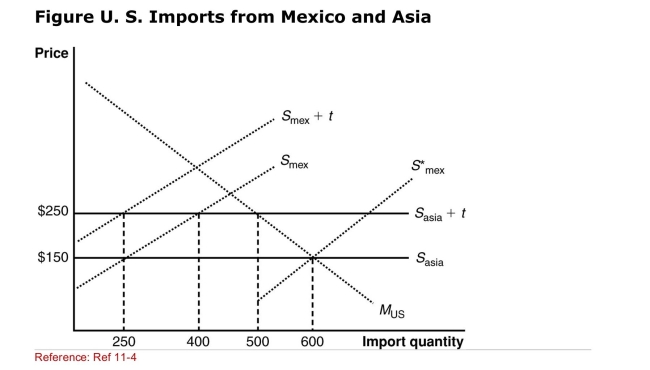 (Figure: U.S.Imports from Mexico and Asia) If the United States
(Figure: U.S.Imports from Mexico and Asia) If the United StatesForms a customs union with Mexico, it will result in a(n) _______
In producer surplus of ______ for Mexico.
A)increase; $25,000
B)increase; $50,000
C)increase; $32,500
D)decrease; $50,000

Unlock Deck
Unlock for access to all 152 flashcards in this deck.
Unlock Deck
k this deck
78
Indian exporters are concerned about trade diversion because
_________ made an agreement with the ASEAN freetrade area.
A)India
B)China
C)the United States
D)Mexico
_________ made an agreement with the ASEAN freetrade area.
A)India
B)China
C)the United States
D)Mexico

Unlock Deck
Unlock for access to all 152 flashcards in this deck.
Unlock Deck
k this deck
79
Figure U.S.Imports from Mexico and Asia 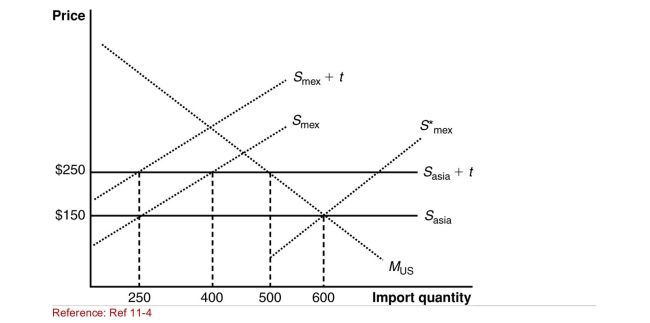 (Figure: U.S.Imports from Mexico and Asia) The combined
(Figure: U.S.Imports from Mexico and Asia) The combined
Welfare of the United States and Mexico is _______ by ______.
A)lower; $7,500
B)higher; $10,000
C)lower; $25,000
D)higher; $25,000
 (Figure: U.S.Imports from Mexico and Asia) The combined
(Figure: U.S.Imports from Mexico and Asia) The combinedWelfare of the United States and Mexico is _______ by ______.
A)lower; $7,500
B)higher; $10,000
C)lower; $25,000
D)higher; $25,000

Unlock Deck
Unlock for access to all 152 flashcards in this deck.
Unlock Deck
k this deck
80
Suppose initially there is no customs union and that the $100
Tariff is imposed by the United States.Now, Mexico invests in
Productive technology and it shifts the Mexican supply curve to
SMex.The United States now forms a customs union with Mexico.
This will result in a price of _______ and imports of _______.
A)$250; 500
B)$250; 400
C)$150; 600
D)$150; 500
Tariff is imposed by the United States.Now, Mexico invests in
Productive technology and it shifts the Mexican supply curve to
SMex.The United States now forms a customs union with Mexico.
This will result in a price of _______ and imports of _______.
A)$250; 500
B)$250; 400
C)$150; 600
D)$150; 500

Unlock Deck
Unlock for access to all 152 flashcards in this deck.
Unlock Deck
k this deck



